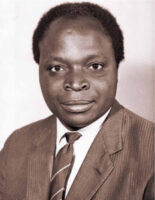
President Mwai Kibaki’s style of governance is that of a competent technocrat. Thus, public affairs are better organised since he took over in December 2002. The economy has done well despite the post-election chaos of 2008 and Kenya is much freer than during the eras of Presidents Jomo Kenyatta and Daniel Moi.
The August 4, 2010, ratification of the new Constitution is another feather on the President’s cap. He galvanised the country — campaigning in all corners of Kenya — in support of the new laws and the outcome was the overwhelming victory of 67 per cent. For him, this was the realisation — as he told a local newspaper — of a 50-year desire to change the colonial laws. It was also the end of a chapter that would have been closed in 2005 if divisive politics had not clouded the issues.
Like his predecessor Moi, who as Vice-President had withstood disrespect from juniors, Kibaki took the demotion from the Vice-Presidency to Minister for Health in 1988 in his stride. Notwithstanding the tribulations he underwent as Vice-President and Cabinet minister, and even later as the Leader of the Official Opposition, he bid his time and was even accused of being a “fence-sitter”. But this did not seem to worry the veteran politician or remove his eyes from the prize.
Kibaki was elected Kenya’s third president in the December, 2002, General Election, with the support of politicians who had just rebelled from Kanu.
Born on November 15, 1931, in Othaya, Nyeri, Kibaki was the youngest son of Kibaki Githinji and Teresia Wanjiku. He was baptised Emilio Stanley by missionaries in his youth, names he no longer uses.

As a boy, Kibaki was expected to look after his father’s livestock, but a brother-in-law impressed it on his father to take him to school, where he turned out to be an exceptionally bright student. He went to Gatuya-ini and Karima Mission schools, and then attended Mathari School (now Nyeri High) between 1944 and 1946 for Standard Four to Six classes. In addition to academic studies, he learnt carpentry and masonry, as students were expected to repair furniture and maintain school buildings. Like everyone else, he grew his own food at school. During the school holidays, he worked as a conductor for the Othaya African Bus Union to earn some pocket money. At the end of primary school education, he performed exceptionally well and was admitted to the top Catholic school in the country, Mangu High, in 1947. He sat the final examinations in 1950 and passed with six points, the best possible grade.
Influenced by soldiers of the Second World War who had returned home in 1945, he considered becoming a soldier in his final year at Mangu. However, the Colonial Secretary, Walter Coutts, barred the recruitment of the Gikuyu, Embu and Meru communities into the army. This put paid to Kibaki’s military ambitions.
